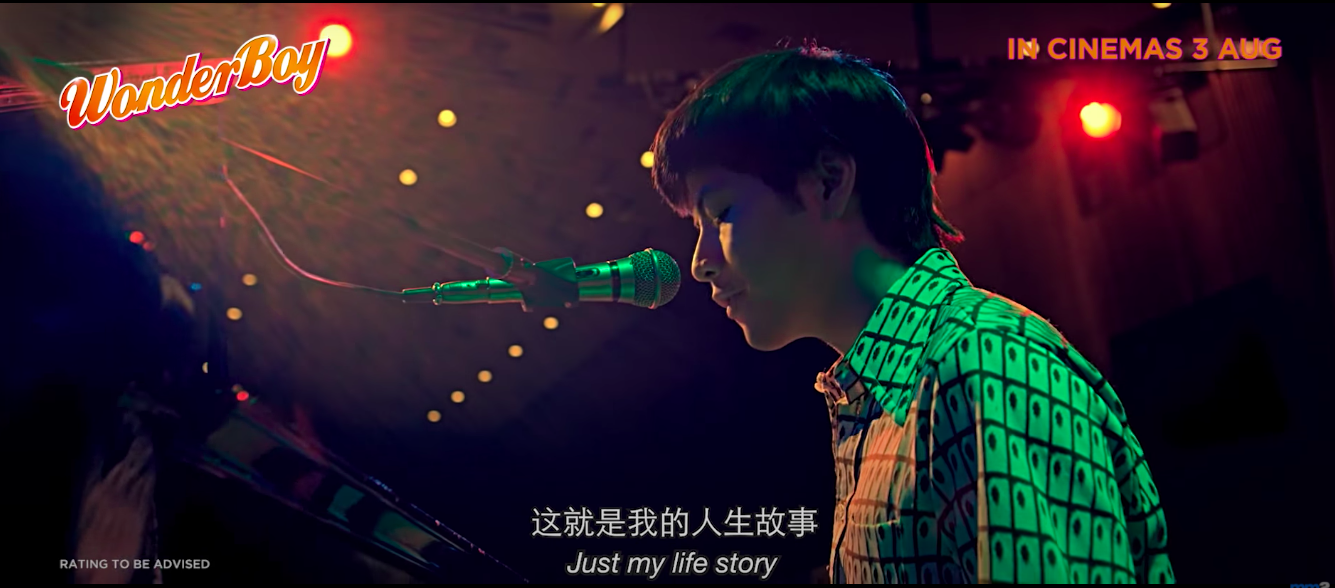A uniquely local biopic interwoven with musical elements, the film depicts the three transformative years of Dick Lee’s youth. The unrevealed life of our celebrated singer-songwriter, performer, and composer is now shown on the big screens. Directed by Dick Lee himself, he brings to the viewers a glitzy world of love and pain, the beauty of life as he had seen and walked. Set in the retro 1970s, the evocative film showcases the intricacies of an old Singapore, along with the jarringly dark, hedonistic sides — drugs, sex, and prostitution.
Starring Benjamin Kheng as the titular star, viewers follow him on a journey in search of his dreams amid all adversities. The film begins with Dick’s passionate play at home, singing a song of his own fervently as his nimble fingers danced across the piano keys with ease. However, his enthusiasm is immediately quelled by the disapproval of his family members. His father stated scathingly that “Pop stars are all drug addicts”. This is in reference to the negative reputation of Elton John and Led Zeppelin in those days; Dick had very much emulated Elton John in a time when rock music was prohibited. An outcast already in his own home, Dick’s dream to pursue music had begun with a rocky start.
The story, however, is a hotchpotch of scenes. Separate stories with barely any interlinking plotline constituted Wonder Boy, strung together hurriedly in the painful 96 minutes that is only saved by its music arrangements. Dick’s first hardship is shown in his attempt to fit in with the like-minded schoolmates who had despised him initially. Eventually they were won over by Dick’s musical talent and formed the eponymous Wonder Boys. Their talents were discovered by the school, earning them the second place in the Talent Time competition for singing song covers. However, the group had evicted Dick due to his rather snide remark on the reason for their loss: “We should have sung my songs instead.” His insistence on singing his self-penned songs during times when people were only receptive towards covers and radio hits, and especially his arrogance, had Dick alienated.
Then, Dick’s second ordeal is illustrated in the form of Linda (Julie Tan), the bad girl next door. They had an instant attraction, both walking out of their Ordinary Level (GCE O-Level) examination, kindling a relationship that speaks only of trouble. Polar opposites, an innocent lad and a sexual deviant, they entered the psychedelic, darker side of the world. Drugs, sex, alcohol; Dick indulged himself endlessly in Linda’s companionship and the seemingly faithful support of his groupies. Linda, too, had wanted to elope with him, preying on his naivety in hopes of a paradise. In the end, Linda left inexplicably, leaving only the news of a bun in the oven.
Dick is shown to mope incessantly about his first true love leaving him, striving to find solace in his music. Notably, Julie Tan’s role is awkwardly short for someone who had been widely promoted as the main heroine of the film. The film had the prospect to delve further into Dick and Linda’s relationship too — their love, dispute, and escape. However, their story had ended as randomly as it had started. Julie’s bland character is poorly written, serving little purpose in the film except for Dick’s change into a sombre and pensive man.
From falling out with his band, failing his examinations, his ex-girlfriend getting pregnant, and a bad relationship with his family members, there are too many conflicts to focus on in Wonder Boy. Finally, the film moves towards a closure, showing Dick’s petulant self exacerbating his worsening familial ties. His sister (Michelle Wong), Pat’s attempt to mend the broken bonds has succeeded, albeit at a cost — her death. The sudden and short scene of Pat’s death comes as both shocking yet horrifying. A misplaced segment, it has failed to invoke the grief intended behind this tragedy although it has succeeded in drawing the curtains to a close. Dick has become close to his parents again, regretting deeply over his sister’s accident and his failure to attend the surprise birthday party she had organised.
Finally, the story pans to the end of the successful Dick after the numerous obstacles he had faced and the unwavering support he had. Home, the iconic song, is sung by Dick Lee himself who made a special appearance at the very end. All in all, this film is an honest tale of the difficulties Dick had overcome in his journey to become the musician he is today. Although, I do feel that making a series of short episodes would do Dick a better justice in the portrayal of his life.
In particular, I had enjoyed the songs in the film, especially Follow Your Heart. It is a poignant tale, the message being to follow our dreams and persevere despite all odds. The vintage cinematography and the focused shots are done exceptionally well, transporting the viewers into an anachronistic Singapore, a beauty unfolded carefully within the film. Overall, Wonder Boy is a good film for a music connoisseur-to-be and not so much for one looking for a well-paced story.




























